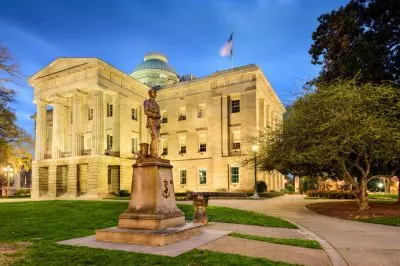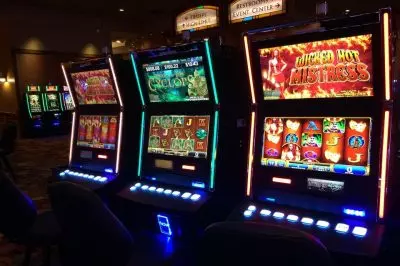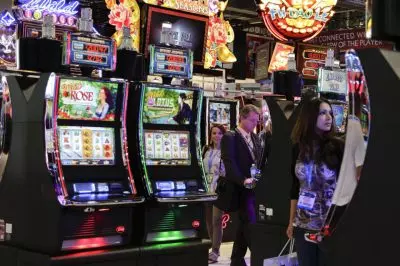 North Carolina’s legislature approved a bill that would legalize video gaming machines through the state lottery. The lawmakers discussed the subject during a late session earlier this week. Proponents of the idea insist that the introduction of proper regulation would help eradicate shady gaming machine parlors. The bill that would regulate the machines gained the approval of the House Commerce Committee.
North Carolina’s legislature approved a bill that would legalize video gaming machines through the state lottery. The lawmakers discussed the subject during a late session earlier this week. Proponents of the idea insist that the introduction of proper regulation would help eradicate shady gaming machine parlors. The bill that would regulate the machines gained the approval of the House Commerce Committee.
The legislation would allow video lottery terminals, while the North Carolina Lottery Commission would receive authorization to permit restaurants and bars across the state to operate a maximum of ten machines. The same goes for convenience stores that sell alcoholic beverages such as wine or beer.
Customers of these establishments would be able to enjoy chance-based games and redeem their winnings directly on the spot. Understandably, video gambling machine vendors and owners would have to obtain licenses, while retailers would require contracts with them before they can install the machines on their premises.
Advocates of the legislation are confident legalizing the machines would enable North Carolina to eliminate their unauthorized operation. The state government and law officers have been trying to put a stop to illegal video gaming and sweepstakes machines for years. However, their efforts have so far come to nothing. Unlawful parlors with rigged machines continue to pop up across the Tar Heel State.
According to House Representative Harry Warren, who also sponsored the bill, supporters are not pushing for the legislation simply for the sake of legalizing the machines. In his assessment, the number of authorized video gambling machines envisaged by the legislation could be 70% smaller than that of the illegal machines currently operating in North Carolina.
Opponents Are Skeptic the Bill Would Stop Illegal Machines
 Some are not as confident that the legalization would hinder such illicit operations. The head of the state’s Family Police Council John Rustin opposes the bill. He pointed out it contained no provisions whatsoever that would outlaw the unauthorized machines. Mr. Rustin spoke harshly about the machines, referring to them as the “crack cocaine of gambling”. In his words, they are highly addictive and cause harm to the North Carolinians that could least afford to lose money.
Some are not as confident that the legalization would hinder such illicit operations. The head of the state’s Family Police Council John Rustin opposes the bill. He pointed out it contained no provisions whatsoever that would outlaw the unauthorized machines. Mr. Rustin spoke harshly about the machines, referring to them as the “crack cocaine of gambling”. In his words, they are highly addictive and cause harm to the North Carolinians that could least afford to lose money.
Edmond Caldwell from the North Carolina Sheriffs’ Association echoed Rustin’s sentiments. Mr. Caldwell said the legislation did nothing to eradicate the unregulated machines that already operate in the state. What it would do, he proceeded, is add more machines that could potentially harm North Carolina’s most vulnerable residents.
The people who would play the machines are not affluent high rollers that could afford to visit Las Vegas, Caldwell said. On the contrary, most players who would use them might risk the money they need for basic necessities like groceries and rent, he added.
The Bill’s Proponents Focus on Building Confidence in the Machines
 Members of the House Commerce Committee spoke little about the machines’ authorization. Instead, they focused on the distribution of the profits the state would collect from them. Some of the money would go toward funding a loan program for community college students in North Carolina. The five public colleges for African Americans would collect $2 million from the proceeds each year.
Members of the House Commerce Committee spoke little about the machines’ authorization. Instead, they focused on the distribution of the profits the state would collect from them. Some of the money would go toward funding a loan program for community college students in North Carolina. The five public colleges for African Americans would collect $2 million from the proceeds each year.
Those who operate the machines would collect 35% of the revenue whereas the retailers contracting with them would pocket 25%. Proponents of the bill said they intend to focus on building public confidence in the regulated machine operations. The North Carolina Lottery Commission and the Division of Alcohol Law Enforcement would have the remit to inspect the machines. Video gambling terminals without permits would be deemed illegal.
Respectively, license applicants would undergo an assessment to ensure they have no past criminal records. In this vein, the legislation contains various provisions that focus on preventing people who have partaken in illicit activities from operating such machines. The legislation will now advance to the House Finance Committee for further consideration.